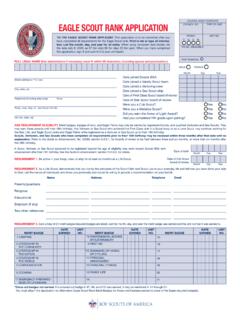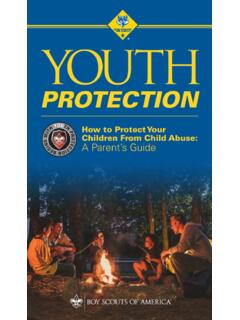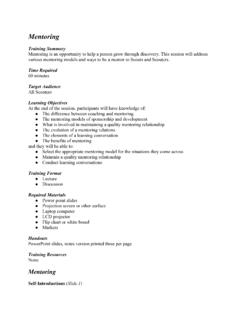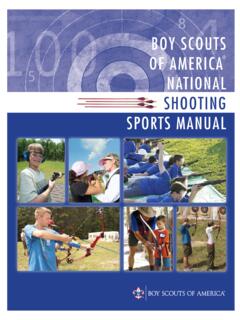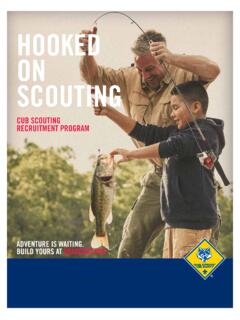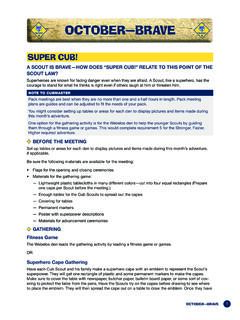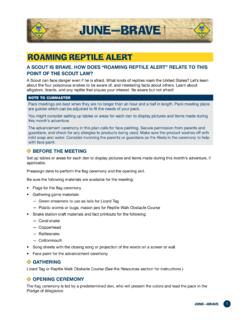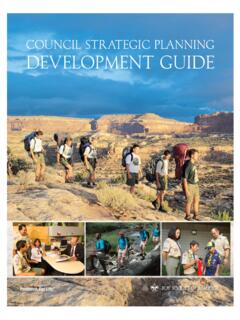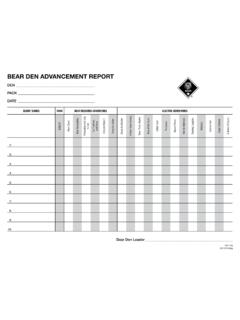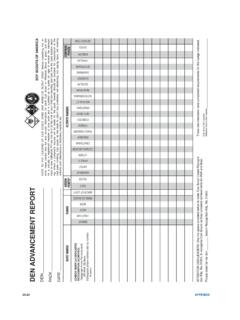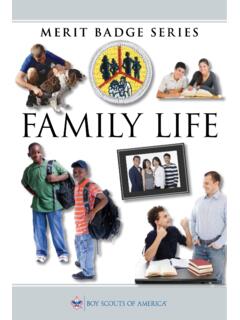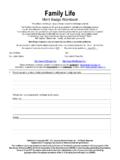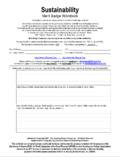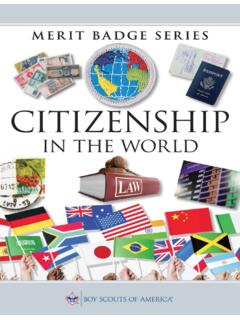Transcription of CITIZENSHIP IN SOCIETY
1 CITIZENSHIP IN SOCIET YBOY SCOUTS OF AMERICAMERIT badge SERIES Enhancing our youths competitive edge through merit badges For a Spanish version of this document, click herePara obtener una versi n en espa ol de este documento, haga clic aqu 2 CITIZENSHIP IN for ScoutsThe focus of the CITIZENSHIP in SOCIETY merit badge is to provide you with information on diversity, equity, inclusion, and ethical leadership. You ll learn why these qualities are important in SOCIETY and in Scouting, as well as how to help other people at all times and serve as a leader and an upstander. The Boy Scouts of America continues to be committed to developing a culture in which every youth, volunteer, and employee feels included and welcomed and to building communities where every person feels respected and valued.
2 We welcome families and individuals of all backgrounds and identities to help prepare young people to serve as successful members and leaders of our nation s increasingly diverse communities. We are committed to creating inclusive environments and promoting a culture of respect and belonging for all. We expect all members to be guided by the Scout Oath and Scout Law. o As found in the definition of reverent in the Scout Law, we expect our Scouts to respect the beliefs of others, both within and outside of Scouting. We want everyone who follows the values of the Scout Oath and Scout Law to feel welcomed and able to take advantage of the many opportunities Scouting provides, and we want every Scout to feel a sense of acceptance and inclusion in their unit and in Scouting.
3 We expect and appreciate that our Scouts do their best to make all feel welcomed. o Learning about and understanding different identities and abilities will help each Scout understand what to do to help make other Scouts feel welcomed and find a sense of belonging in 2021 Boy Scouts of America3 CITIZENSHIP IN for ScoutsBy now in your journey as a Scout, you have probably completed other merit badges and become familiar with using the merit badge pamphlet that usually accompanies the requirements. The process of earning this merit badge will be different, as it intentionally places the responsibility of research and identification of resources on you instead of using a merit badge pamphlet.
4 You are encouraged to explore as deeply and broadly as you see fit for your personal learning and growth. Your merit badge counselor may, for certain requirements, ask you to identify your sources. Your counselor will not be providing you with answers or resources, but will be engaging you in conversation to ask about what you have learned and how you plan to apply your new knowledge to your life as a Scout and as a good citizen in SOCIETY . As you undertake these learnings, think about how you can demonstrate the values of the Scout Oath and Scout Law in your daily CITIZENSHIP IN Discussion requirements will be either with a counselor and another individual (in accordance with Youth Protection Guidelines ), or with your counselor and a small group (of Scouts), depending upon your preference.
5 1. Before beginning work on other requirements for this merit badge :a. Research the following terms, and then explain to your merit badge counselor how you feel they relate to the Scout Oath and Scout Law: Identities Inclusion Diversity Discrimination Equity Ethical Leadership Equality Upstander 2. Document and discuss with your counselor what leadership means to you. Share what it means to make ethical Research and share with your counselor an individual you feel has demonstrated positive leadership while having to make an ethical decision.
6 (It could be someone in history, a family member, a teacher, a coach, a counselor, a clergy member, a Scoutmaster, etc.)b. Explain what decision and/or options that leader had, why you believe they chose their final course of action, and the outcome of that Consider ethical Think about a time you faced an ethical decision. Discuss the situation, what you did, and how it made you feel. Share if you would do anything differently in the future and if so, what that would be. 5 CITIZENSHIP IN SOCIETYb. List three examples of ethical decisions you might have to make in the future at school, at home, in the workplace, or in your community, and what you would do.
7 Share how your actions represent alignment with the Scout Oath and Scout Law c. Explain to your counselor how you plan to use what you have learned to assist you when that time comes, and what action(s) you can take to serve as an upstander and help other people at all Repeat the Scout Oath and Scout Law for your counselor. Choose two of the three following scenarios and discuss what you could do as a Scout to demonstrate leadership and your understanding of what it means to help others who may seem different from you:a. Scenario 1: While at camp, a youth accidentally spills food on another camper.
8 The camper who gets spilled on gets angry and says something that is offensive to people with disabilities; their friends laugh. What could/should you do?b. Scenario 2: Your friend confides in you that some students in school are making insulting comments about one of their identities, and that those same students created a fake social media account to impersonate your friend online and post messages. What could/should you do?c. Scenario 3: A new student in your class was born in another country (or has a parent who was born in another country). Your friends make rude comments to the student about their speech or clothes and tell the student to go back home where you came from.
9 What could/should you do?5. Document and discuss with your counselor:a. Ideas on what you personally can do to create a welcoming environment in your Scouting unit. b. An experience you had in which you went out of your way to include another Scout(s) and what you did to make them feel included and Things you can do to help ensure all Scouts in your unit are given an opportunity to be heard and included in decision-making and CITIZENSHIP IN SOCIETY6. With your parent s or guardian s approval, connect with another Scout or youth your own age who has an identity that s different from yours.
10 (This means a trait, belief, or characteristic different from you.)a. Share with each other what makes the different aspect of your identity meaningful/special to you. b. Share with each other either one of the following: i. A time you felt excluded from a group. What was the situation? How did it make you feel? What did you do? Did anyone stand up for you? What did you learn? Would you do anything differently today? ii. This imaginary situation: You re attending a new school and don t know anyone there yet. You notice they dress very differently than you do.
